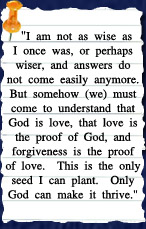


|
Focus on Fiction is pleased to feature W. Dale Cramer Dale is a husband, father, electrician, and the author of wildly praised novels Sutter's Cross and Bad Ground, as well as several published works of short fiction. He makes his home in northern Georgia with his wife Pam and their two sons, Ty and Dusty. |
|
Focus: Dale, thank you so much for joining us! Would you begin our interview by telling our readers how many stories you've published in the Christian market? Dale Cramer: Two, so far. Sutter's Cross last year and Bad Ground this year. Focus: Can you tell us what you feel is the greatest message with which God has entrusted you, and why you've chosen fiction as the medium for that message? Dale Cramer: I'm pretty sure it was J.I. Packer who wrote, "Our doctrine is grace; our ethics is gratitude." That declaration captures my whole belief with a beautiful simplicity. Most everything I write is going to deal with grace or gratitude, or both. I chose fiction as the medium because I've always wanted to write stories and I'm fairly certain it's what I've been called and equipped to do. Focus: Your first novel, Sutter's Cross, is a thoughtful, heart-deep tale set in the Appalachian Mountains. Can you give us a summary of the story? Dale Cramer: A drunken biker crashes into the river in a resort town in the north Georgia mountains and, at the end of his rope, finds God. The story is about his childlike faith and its effect on the town, centering on a conflict between a ruthless developer and a stoic old farm widow. Focus: You worked on this novel for a long time. Once you began the writing process, how long was it before you held Sutter's Cross in published form? Dale Cramer: I sat down and wrote the words, "The first time I ever saw Harley he was wearing my pants" in late 1996 (and believe it or not, the novel grew out of that line). The book hit the stands in late 2002, so about six years in all. Sutter's Cross was essentially an experiment, to see if I could do it. I must have rewritten it six or seven times before I sent it out, but I didn't mind-- I was learning craft. I first sent the manuscript to an agent, who put me through another complete rewrite (and a half) before she signed on. She taught me a lot. Then she sold the book, and the publisher put me through another rewrite. Writing doesn't take that long; learning to write does. Focus: Publisher's Weekly called Sutter's Cross "Well crafted and finely developed", CBA Marketplace said your story would "leave (readers) wishing for more", and Christianity Today called it "subtle…beautiful…a good candidate for repeated readings." For a debut novel this is high praise indeed! Were you surprised by the reviews you received? Dale Cramer: Astonished. I know a writer is not supposed to be surprised at good reviews, but for me the whole experience was so foreign I never knew what to expect. Frankly, I was just hoping not to get tarred and feathered. Focus: You intertwined the lives of three very different men in the story. Of the three, Jake, Web, and Harley, which character most resembles you? Dale Cramer: I could play Jake without a blink. I've worked construction all my life. But really, all of my characters come from inside me in one way or another-- even the bad ones. There but for the grace of God go I. Focus: One of my favorite scenes in Sutter's Cross is when Jake watches his wife's heartsick, rain-drenched piano solo, and then takes her in his arms and says, "You are mag-nificent". How did your twenty-seven years of marriage to Pam influence the relationship you created between Jake and Lori? Dale Cramer: A lot. There was a short scene of Lori stroking her belly and looking at pictures of fetal development that I thought was one of the best pieces of writing in the book, and it was straight from memory. Like Lori, Pam had a molar pregnancy, and her mother died of cancer while I was recovering from burns. It was in those times that I learned who she truly is--the strongest and finest woman I know. Focus: Without giving away the ending of the story, I've got to ask, will your readers ever know what those two sailplanes meant to Jake? Dale Cramer: I know what they meant to me, but I ain't tellin'. I've learned that different people interpret them different ways, and I like that. It lets the reader bring his own understanding to the story. I will say this: I originally wrote it with only one sailplane, but it just wasn't right. When I added the second one, it sang. Focus: One of Jake's diary entries in Sutter's Cross talks about a hard-rock miner he knew who found crystals in bad ground. Did you know at the time you wrote that entry that the hard-rock miner, and Bad Ground, would be your next novel? Dale Cramer: Parts of Bad Ground had been in my head for years when I wrote Sutter's Cross. I hoped to be able to write it someday, but at the time I wasn't published and really didn't know if I ever would be, so a second novel was a fairly remote proposition. Focus: Would you give us a synopsis of the storyline for Bad Ground? Dale Cramer: Bad Ground, as I hinted in Sutter's Cross, is about how God gives us the brightest of gifts in the darkest of places. When Jeremy Prine is orphaned at seventeen he's an overprotected and clueless mama's boy. But his mother leaves instructions, on her death, for him to go find his estranged uncle Aiden (aka Snake), a scarred, bitter, reclusive hard-rock miner. Jeremy's mother, in the wisdom of her final days, knew the two--a boy afraid of the dark; a man afraid of the light--would have something to give each other. Focus: On your website, you talk about enduring a trauma similar to the terrible burn Snake received in your story. Can you tell us a little about your accident? Dale Cramer: The setting for the novel was a real place, a mining operation where I worked back in '85. I was the maintenance electrician. One night when we were about a mile and a half into the tunnel I made a mistake and blew up the motor control cabinet on the mining machine-- while I was inside it. An electrical explosion of that magnitude is pretty intense, and it very nearly killed me. I stayed in the ICU for a week and the burn unit for five weeks, with second and third degree burns from the waist up. It was a dark time, but it was also the beginning of a dialog with God that led me to a deeper understanding. It was that experience which gave me the theme, and much of the material, for Bad Ground. Focus: Ernest Hemmingway once said of writing "…sometimes it comes easily and perfectly; sometimes it's like drilling rock and then blasting it out with charges." Was Bad Ground a difficult story to write? Dale Cramer: Actually it was fairly easy, which is a good thing, since I had to do it in less than a year while home schooling my son. The main reason I chose Bad Ground as the second book was because I knew I didn't have much writing time, and of all the stories in my head this was the one I knew the most about. Focus: Now that Bad Ground has been released, what's next for you? Can you give our readers a sneak peek of what's on the horizon from Dale Cramer? Dale Cramer: I'm fictionalizing my father's story. He was raised Amish, but ran away and changed his name. It took him fifty years to get back in the good graces of his father. It's a thoughtful story about legalism, grace, stubbornness, pride, forgiveness, family, honor, sin and redemption. This one is proving harder to write-- a lot of drilling and blasting. Focus: Is there anything else you would like your readers to know? Dale Cramer: There's a scene in the book I'm working on now, where a thoroughly broken man confides in a little priest on a ship in the middle of the ocean. The priest's answer speaks my heart for each of my readers. He says: "I am not as wise as I once was, or perhaps wiser, and answers do not come easily anymore. But somehow you must come to understand that God is love, that love is the proof of God, and forgiveness is the proof of love. This is the seed I can plant. Only God can make it thrive." |











© Focus on Fiction, 2003-2005 All Rights Reserved. Site maintained by PulsePoint Design. Direct questions or comments here
| Home | Upcoming Author Interviews | Past Author Interviews | Christian Fiction Reviews | About Us | | FAQ’s | Contact Us | Links |